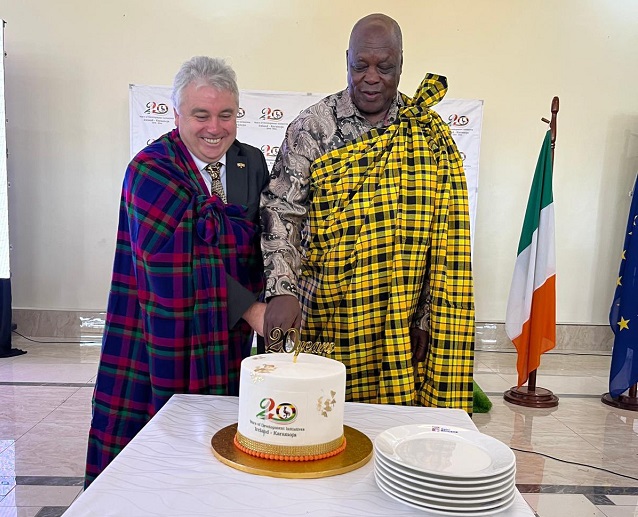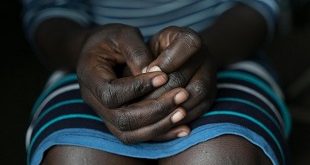
Moroto, Uganda | THE INDEPENDENT | Ireland Embassy in Uganda has commemorated its twentieth anniversary of steering development initiatives in the Karamoja sub-region.
H.E Kevin Colgan, the Irish Ambassador to Uganda noted that it is important to maintain Ireland’s connection with the region for than twenty years of Irish missionaries and Non-Governmental Organizations that have worked in the region since the 1970s to 80s.
He noted that their first project was the rehabilitation of Kangole girl’s secondary school and his predecessors left their footprint in Karamoja over the years.
Colgan said that the anniversary is an opportunity to look to the future and to consider what is ahead for Karamoja over the next decades.
Colgan described Karamoja as a unique region with beauty, culture, and tradition which continues to be a very strong affinity between the Irish and Karamojong, helped by many similarities such as the sharing of cattle as a great pride.
Colgan noted that the progress made in the last twenty years across so many measures of human development.
He noted that they are heartened by the remarkable transformation that the region has experienced in maintaining peace in recent years and they are grateful to be part of the journey.
Colgan reiterated that through their Embassy’s current strategy, they shall continue with a strong focus on Karamoja to build on previous gains and emphasize gender, climate action, peace, and conflict resolution to increase the resilience of Karamojong to future shocks and crises.
He said that they are looking forward to aligning their work with the Ugandan government for the fourth National Development Plan by providing quality support and investment in Karamoja for its people.
Colgan vowed to continue supporting the work of the Gender Technical Unit within the Ministry of Education and Sports which leads efforts to improve access to education and skilling for girls to tackle issues such as teenage pregnancies.
Meanwhile, the local leaders in the Karamoja sub-region commended the Irish government for transforming the education and the health care system.
Felix Lochale, the LC5 chairperson of Karenga district commended the Irish government for promoting education and improving the health care system in the region.
Lochale noted that the partner has invested a lot in education by offering scholarships, supporting school feeding programs, and constructing dormitories and classrooms which reduced the burden from the government.
He also lauded the Irish government for setting up the Neonatal intensive care unit in the hospitals for premature babies and the establishment of a blood bank in Moroto Regional Referral Hospital that has helped to save many lives of Karamojong people.
Lochale observed that the partner is focusing so much on Education knowing that it is the only tool that can change the Karamojong community. He urged the Irish Embassy to consider taking all the Karamojong children for compulsory boarding education to tackle child marriage and the usage of young boys in the kraals.
Lochale noted that the Irish Embassy has also entered into the issues of governance, and human rights among others which are necessary for the development of the region.
Meri Jino, the LC5 chairperson of Kaabong district shared the same experience with Lochale stating that many of the Karamojong children have accessed secondary education because of the Irish Aid.
Jino said that they celebrate the support of the Irish aid for 20 years of existence in the region with a lot of impactful programs on the ground.
He appealed to other partners to emulate the good work that the Irish government has done to transform the Karamojong community.
Meri urged the Irish government to continue supporting the region because they are still struggling to catch up with the rest of the country in terms of development.
Joseph Komol Lotee described the relationship between the Irish government and the people of Karamoja as a cordial one that has demonstrated strategic and comprehensive diplomatic cooperation. Lotee said that the Irish Aid has greatly supported education and health.
Lotee noted that the Irish aid allocated 28 slots of students for bursary in each of the districts across the entire region per year which is a significant achievement to the people of Karamoja.
He said that the health care system has also been improved and sponsoring the civil savants who are still working to further their studies at masters levels.
Lotee noted that very many partners have been operating in the region with no great impact on the ground as compared to the Irish Embassy.
He vowed to continue working with the Irish government and cherish the relationship built for the betterment of the Karamoja community.
Joseph Lobot, the LC5 Chairperson of the Amudat district noted that the Embassy of Ireland has supported maternal health and HIV AIDS control in the community.
Lobot noted that the partners have been engaging the different structures in the communities to find possible measures to reduce the HIV AIDS prevalence rate. He said that the HIV prevalence rate has gone down because of the contribution from Ireland.
Lobot also noted that the Embassy also supported WFP in coming up with a lean program for the people who were starving due to hunger during the time of drought.
He said that the Ireland Embassy took Karamoja as their constituency and much of the interventions were supported by the Irish government while other partners supplemented.
The organization began its programs in 2004 after establishing an office in the Moroto district as part of its long-term commitment to development.
The projects were made possible through other partners such as UNICEF, Uganda Law Society, International Justice Mission, Straight Talk Foundation, World Food Programme, NAWOU, AVSI Foundation, C&D, CUAMM, World Vision International, Oxfam, and Goal all operating in the region.
The investment was a universal post-primary education and training Programme, building school Infrastructures, supplying education materials, training teachers providing bursary support for students, and strengthening the health care system in the region. The presence of Ireland’s development initiatives has grown over the past two decades to include more than ten programs across multiple sectors focusing on empowering communities and enhancing human rights.
Education and skilling have been the centerpiece of Ireland’s interventions globally which is reflected in the prioritization of Education in Karamoja. This stemmed from Ireland’s powerful education journey and recognition of its potential to break the cycle of poverty and uplift the entire community.
Since 2006, the Ireland Karamoja Bursary Programme has supported over 7000 young people mostly girls to get an education up to the university level.
Looking beyond Education, the Irish-funded Health Initiatives have also supported two million people in the region over the past two decades through HIV programs, staff training, sexual and reproductive health support, expanding and equipping health centers, and the addition of neonatal units in hospitals. Through partners such as CUAMM, Ireland was also thrilled to recently fund the establishment of the Karamoja’s first-ever blood collection unit at Moroto Regional Referral Hospital meeting the blood needs of 80 percent of the population.
*****
URN
 The Independent Uganda: You get the Truth we Pay the Price
The Independent Uganda: You get the Truth we Pay the Price



